AI Overviews are quietly reshaping how billions of people find brands, experts, and ideas. But while we rely on AI for answers, where does it go for information?
Using Surfer’s AI Tracker, which analyzed 36 million AI Overviews and 46 million citations between March and August 2025, we uncovered which domains Google’s AI cites most and how that trust varies by industry.
From Finance and Health to Gaming, E-commerce, and SEO, the findings reveal a clear pattern: AI blends institutional authority with community insight. Wikipedia and YouTube still reign supreme, but domain-specific experts such as NIH, Shopify, and ScienceDirect are emerging as trusted pillars within their niches.
The result is a new framework for visibility in search: to be discovered, you don’t just have to rank; you have to be citable.
The universal citation giants: YouTube, Wikipedia, Google
Across nearly every industry, three domains dominate AI’s citations: YouTube (~23.3%), Wikipedia (~18.4%), and Google.com (~16.4%).
Close behind are Reddit, LinkedIn, and Facebook, which contribute a growing share of contextual and community-driven insights.
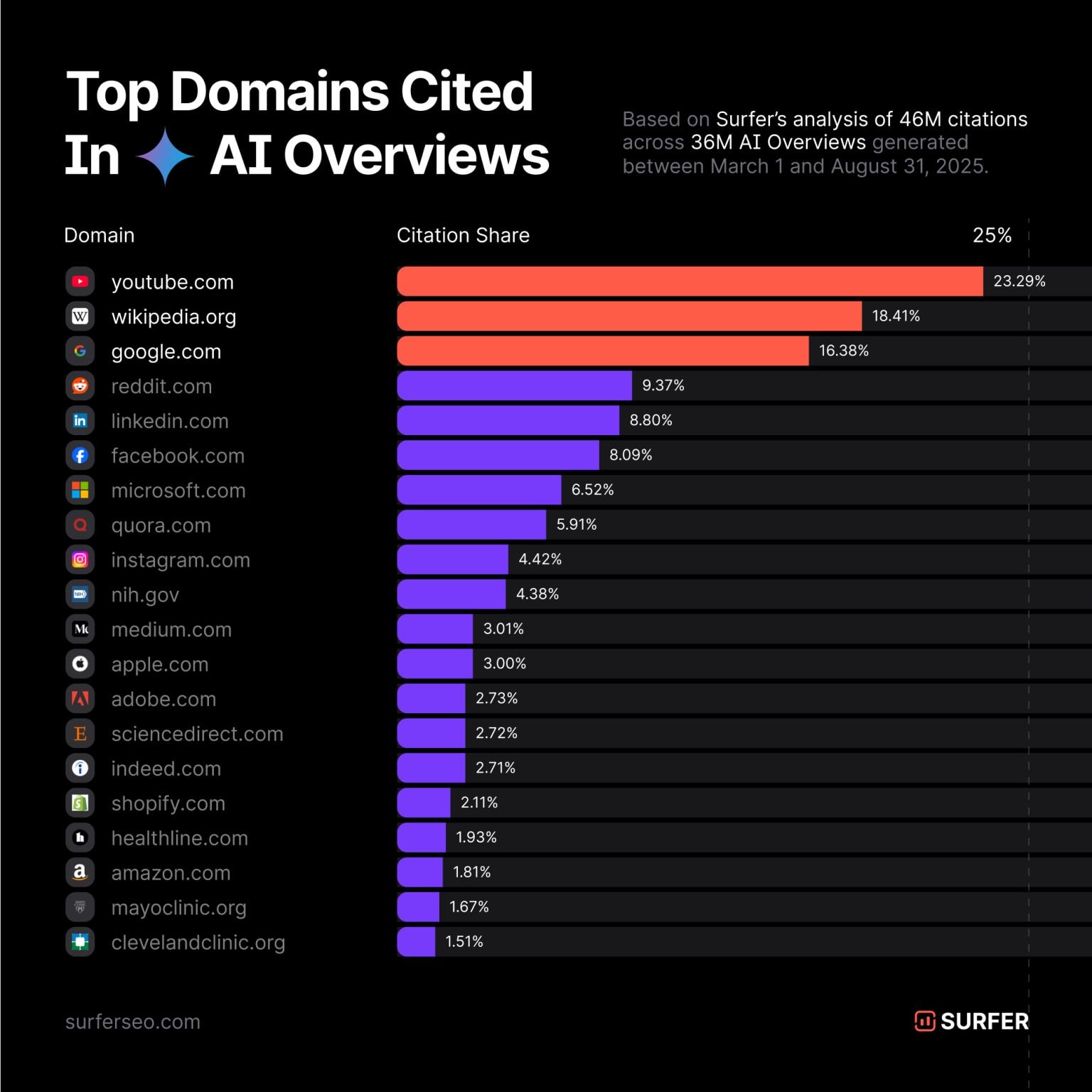
This hierarchy reveals how AI Overviews prioritize both authority and accessibility.
YouTube offers practical, visual explanations that simplify complex topics. Wikipedia provides structured, neutral definitions ideal for summarization.
Meanwhile, Google’s own ecosystem (including Google.com and subdomains like Support or Developers) reinforces foundational knowledge and verified guidance.
This blend mirrors human search behavior: people cross-check information between official sources, educational explainers, and peer discussions. AI appears to replicate that same pattern at scale, selecting sources that balance credibility, clarity, and conversational relevance.
For content marketers, this underscores a key insight: AI citations reward content that educates, contextualizes, and engages.
Brands that build a presence across both high-authority and high-engagement platforms position themselves not only to rank but to be referenced by AI itself.
Finance: AI favors accessible explainers over traditional financial institutions
In finance, YouTube (~23%) dominates citations — users lean on explainers, tutorials, and video commentary for money matters.
Wikipedia (~7.3%), LinkedIn (~6.8%), and Investopedia (~5.7%) provide definitions and professional insights. Community spaces like Reddit and Quora also show up, highlighting a blend of authority and peer-driven advice.
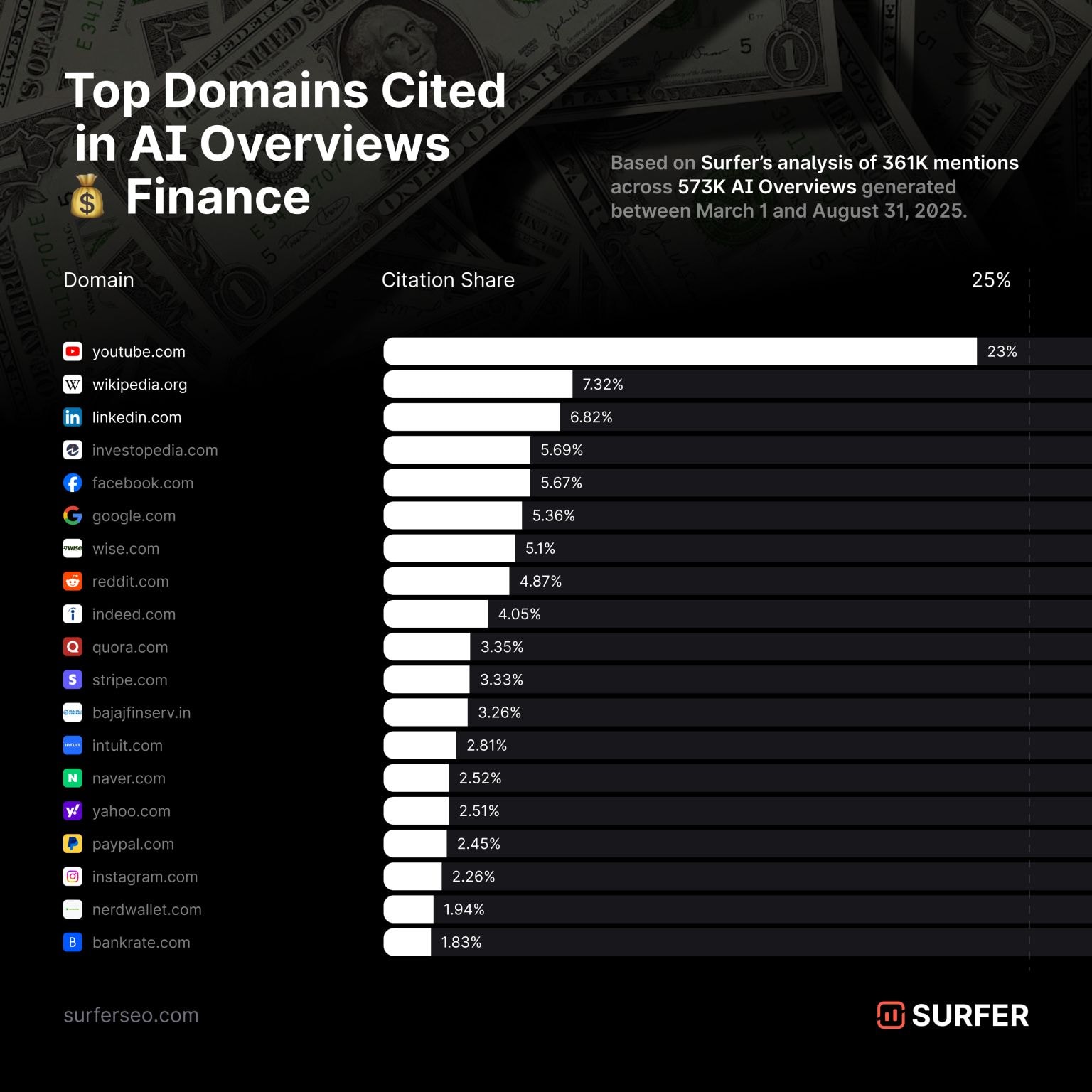
For example, if a user asks, "What are the steps to open a Roth IRA?", AI Overviews might cite a YouTube tutorial, a Wikipedia definition, and a Reddit discussion, showing how different sources are brought together to answer finance-related queries.
As the AI Tracker data shows, financial visibility isn’t only about being “official.” Platforms that package clarity and accessibility are often chosen over traditional institutions.
Takeaway: Pair credible, cited articles with YouTube explainers and LinkedIn thought leadership. Finance brands that build presence across both reference hubs and social platforms stand the best chance of being cited.
Health: Institutional trust dominates, with video supporting patient-friendly clarity
Health queries are dominated by institutions. NIH (~39%), Healthline (~15%), Mayo Clinic (~14.8%), Cleveland Clinic (~13.8%), and ScienceDirect (~11.5%) lead.
YouTube (~28%) still plays a role for approachable explanations and patient-friendly content.
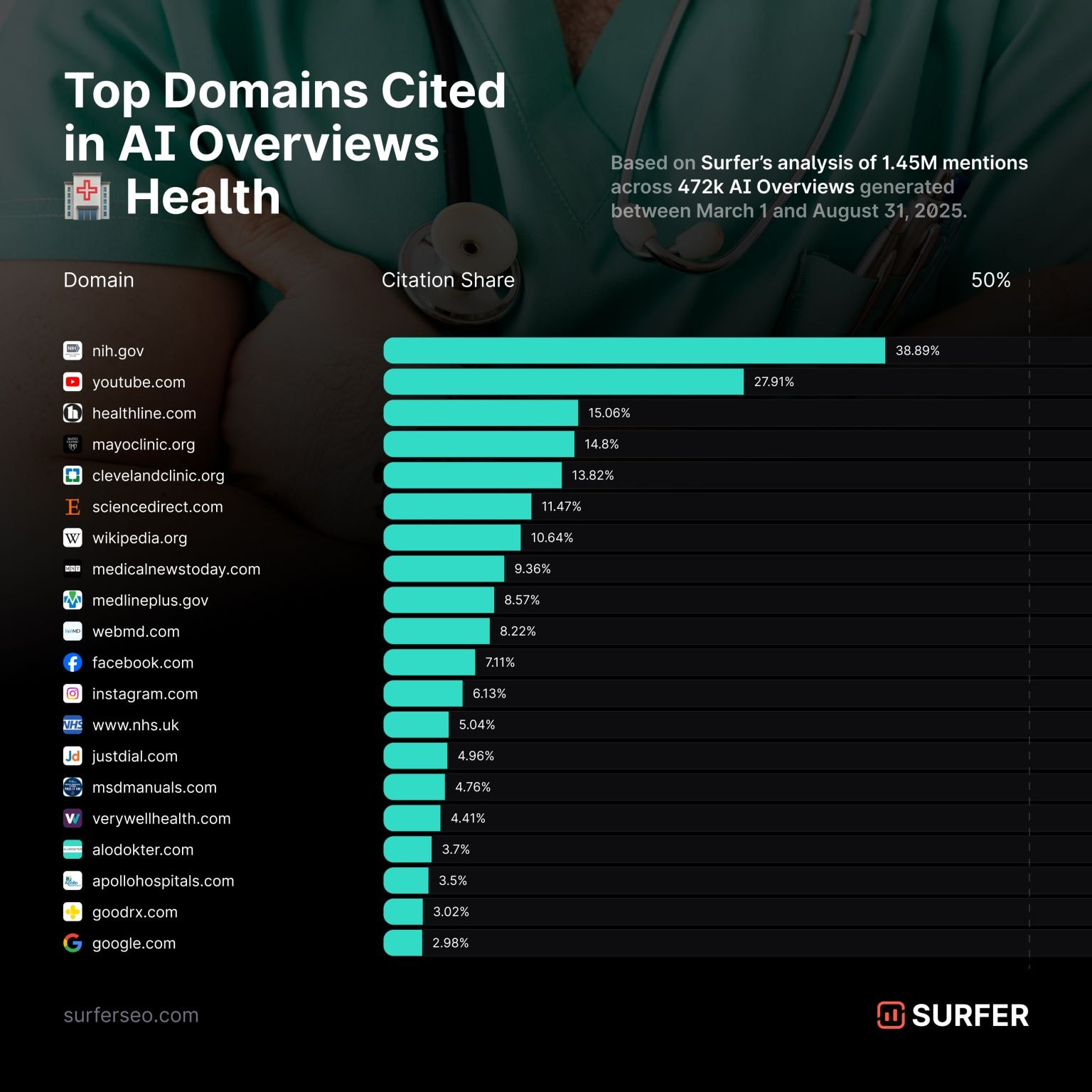
The AI Tracker shows that AI consistently favors peer-reviewed and clinician-vetted sources here, supplementing with videos where they add clarity. Unlike other sectors, social platforms barely register.
Takeaway: In health, E-E-A-T is non-negotiable. Get experts to write or review, cite studies, keep content fresh, and use doctor-led video to stand out in AI citations.
E-commerce: Educational how-tos pair with peer reviews to shape AI shopping insights
YouTube (~32.4%) leads again, followed by Shopify (~17.7%), Amazon (~13.3%), and Reddit (~11.3%). Social platforms and regional marketplaces also appear prominently.
Traditional ads continue to appear in dedicated slots on the search results page, ensuring visibility for advertisers alongside AI-generated summaries.
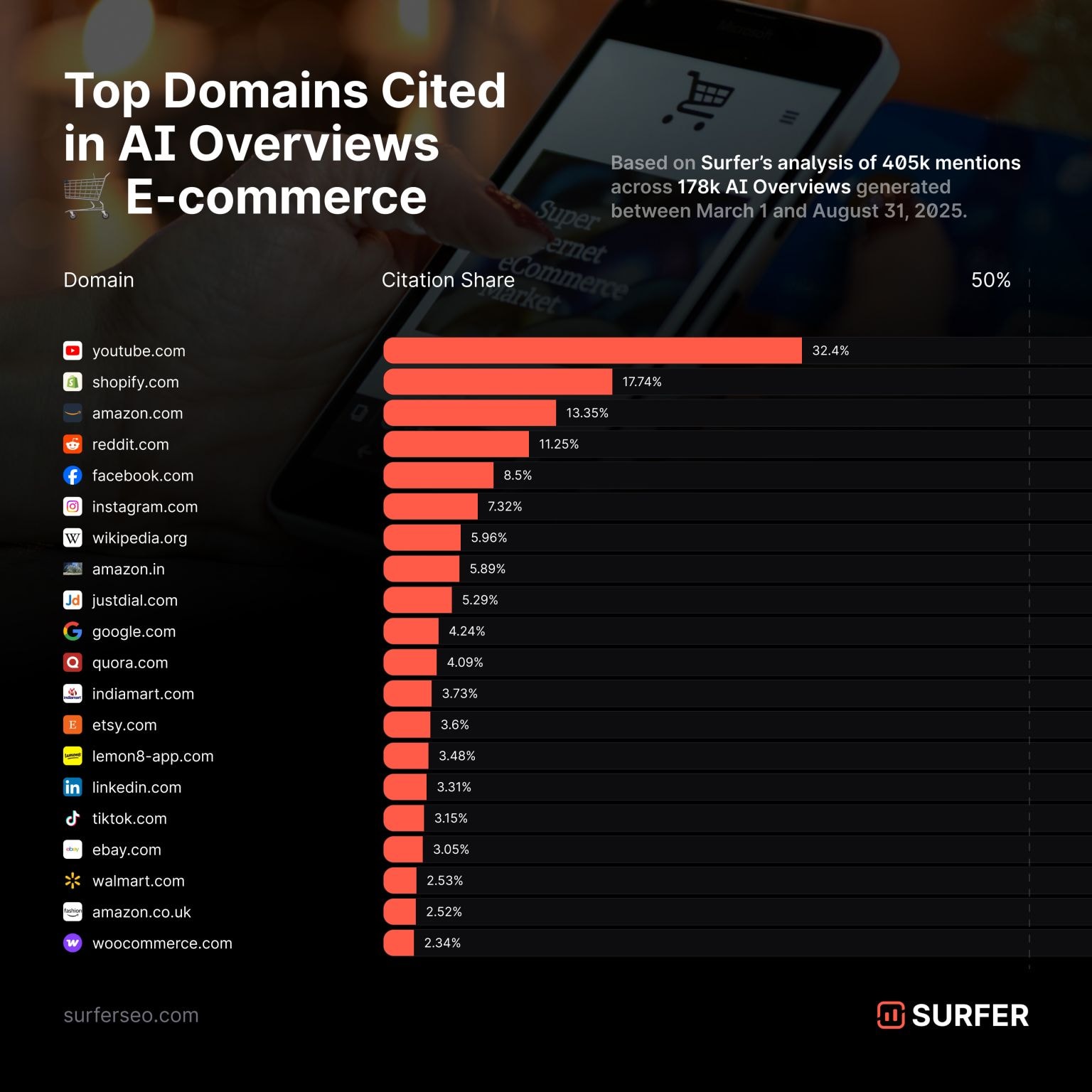
AI Tracker data highlights the dual nature of ecommerce visibility: educational content (Shopify guides, YouTube how-tos) paired with product validation (reviews, forums, directories).
Takeaway: Don’t just sell, teach. Publish guides, optimize product pages/reviews, and maintain a presence in social commerce and local directories to cover every point AI cites.
SEO: Authority is split between Google’s official guidance and practitioner-led insights
For SEO topics, YouTube (~39.1%) and Google.com (~39.0%) are almost tied. Then come LinkedIn (~17%), Semrush (~9.4%), and discussions on Quora and Reddit.
Tool providers and builder blogs (Wix, Hostinger, Ahrefs) also show up strongly.
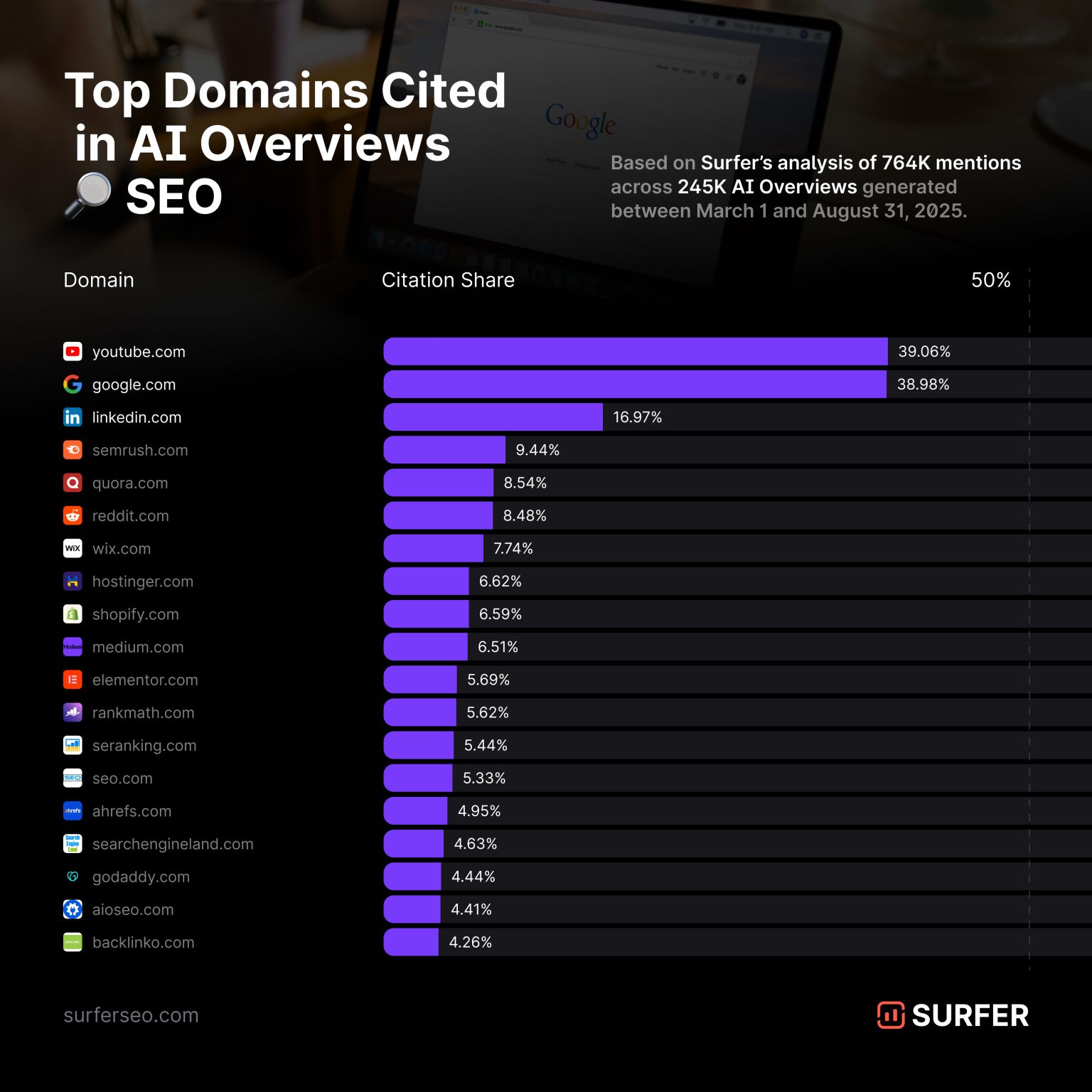
According to Surfer’s AI Tracker, authority in SEO is distributed. AI now has the advanced ability to interpret and synthesize complex SEO concepts from a wide range of sources, making its understanding of authority more nuanced than ever.
Google sets the rules, but the industry tests, debates, and publishes case studies AI recognizes as valuable.
Takeaway: Anchor your content in Google’s guidance, then add unique research, case studies, and videos. Repurpose to LinkedIn and YouTube — that’s where AI already finds practitioner insights.
Gaming: Community-driven walkthroughs and wikis overshadow official publisher content
Gaming is powered by UGC. YouTube (~93%) and Reddit (~78%) overwhelm the field, with Fandom (~26.7%) and Steam Community (~11%) also key. Official publisher sites appear, but far less often.
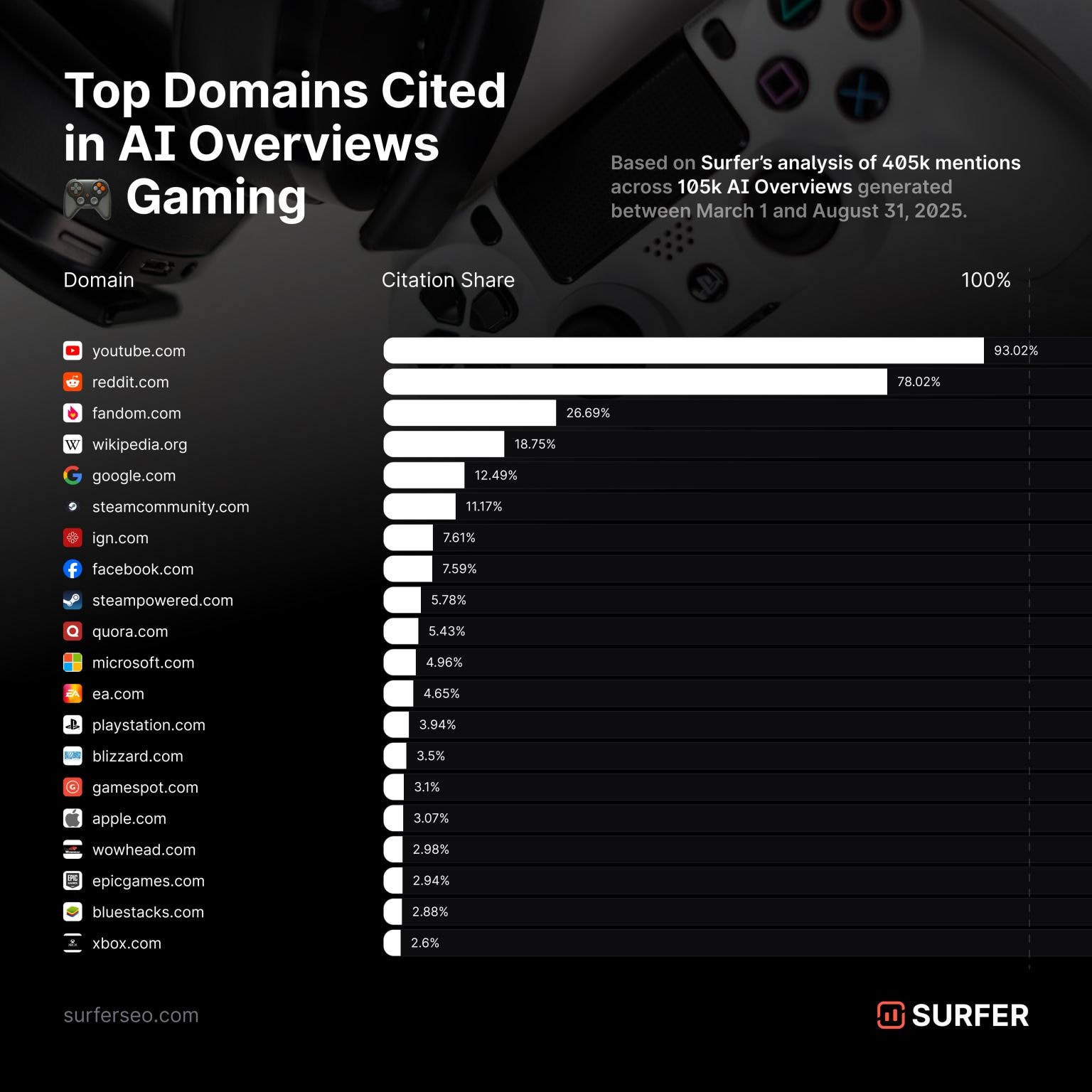
The AI Tracker confirms what gamers already know: the most useful content is created by the community itself.
Walkthroughs, wikis, and discussion threads provide the granular answers AI favors. AI Overviews can describe complex gaming strategies or solutions by interpreting both text and video content from community sources.
Takeaway: Build community authority, publish YouTube tutorials, support fan wikis, and engage authentically on Reddit/Steam. The crowd, not just the brand, drives citations here.
Sports: Fast, visual highlights and wiki stats outcompete long-form sports journalism
Sports queries lean on YouTube (~37.5%) for highlights and Wikipedia (~32.4%) for quick stats. Users can also search with an image to access AI-generated overviews of sports events or players.
Search results now include knowledge about a wide range of things, making sports searches more visual and comprehensive. Facebook (~14.2%), Reddit (~12.8%), and Instagram (~9.7%) add fan chatter and short-form clips.
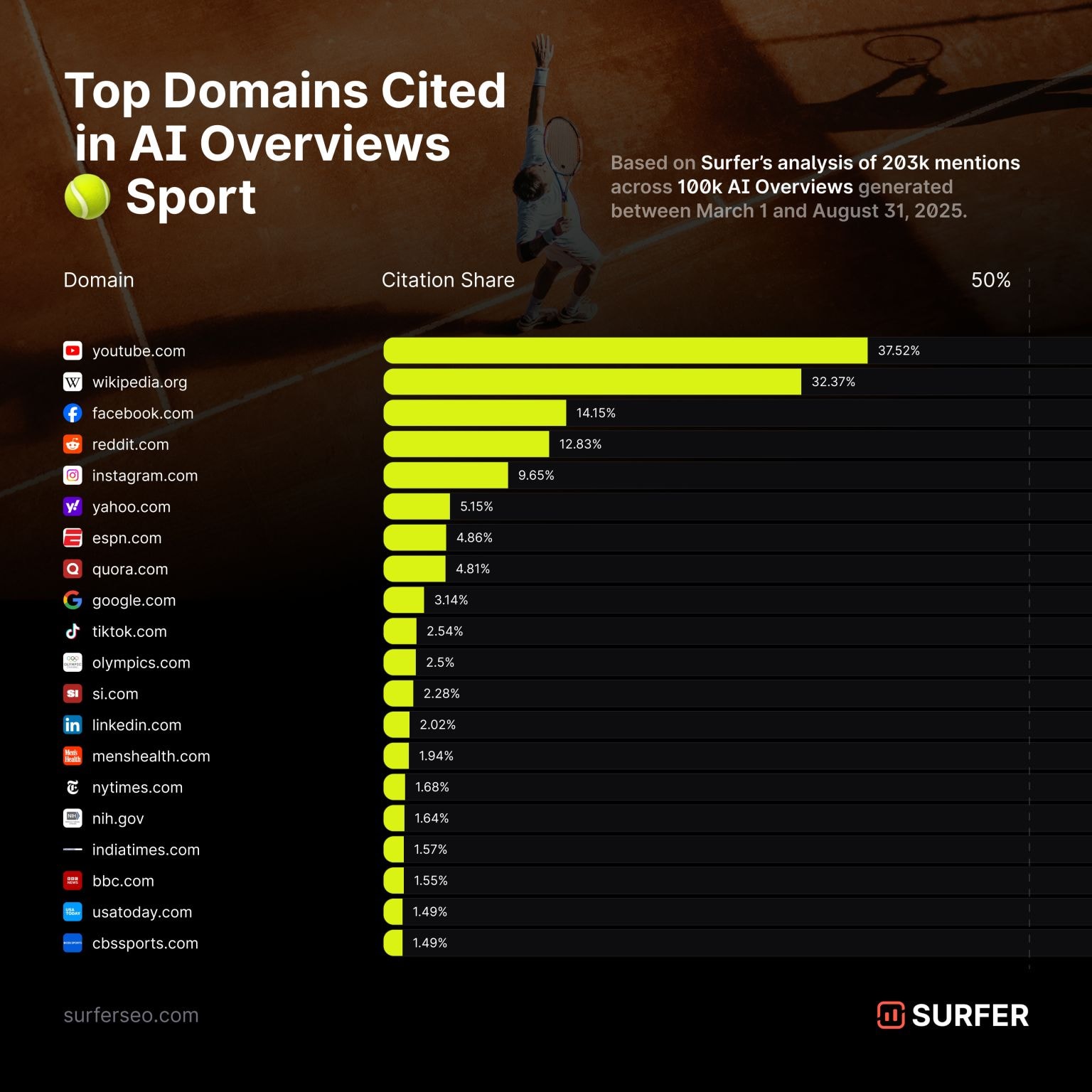
The AI Tracker shows that timeliness and accessibility outweigh traditional media here: Wikipedia’s concise facts and YouTube’s visuals beat long editorial pieces in citation frequency.
Takeaway: Publish fast, well-titled highlight videos, keep Wikipedia data accurate, and join fan communities to secure AI visibility.
Travel: Global booking giants and local experts together drive AI travel guidance
Travel combines inspiration, background, and booking platforms. YouTube (~23.5%), Wikipedia (~12.7%), and Agoda (~10.2%) lead, followed by TripAdvisor, Booking, and regional leaders like MakeMyTrip and Thrillophilia.
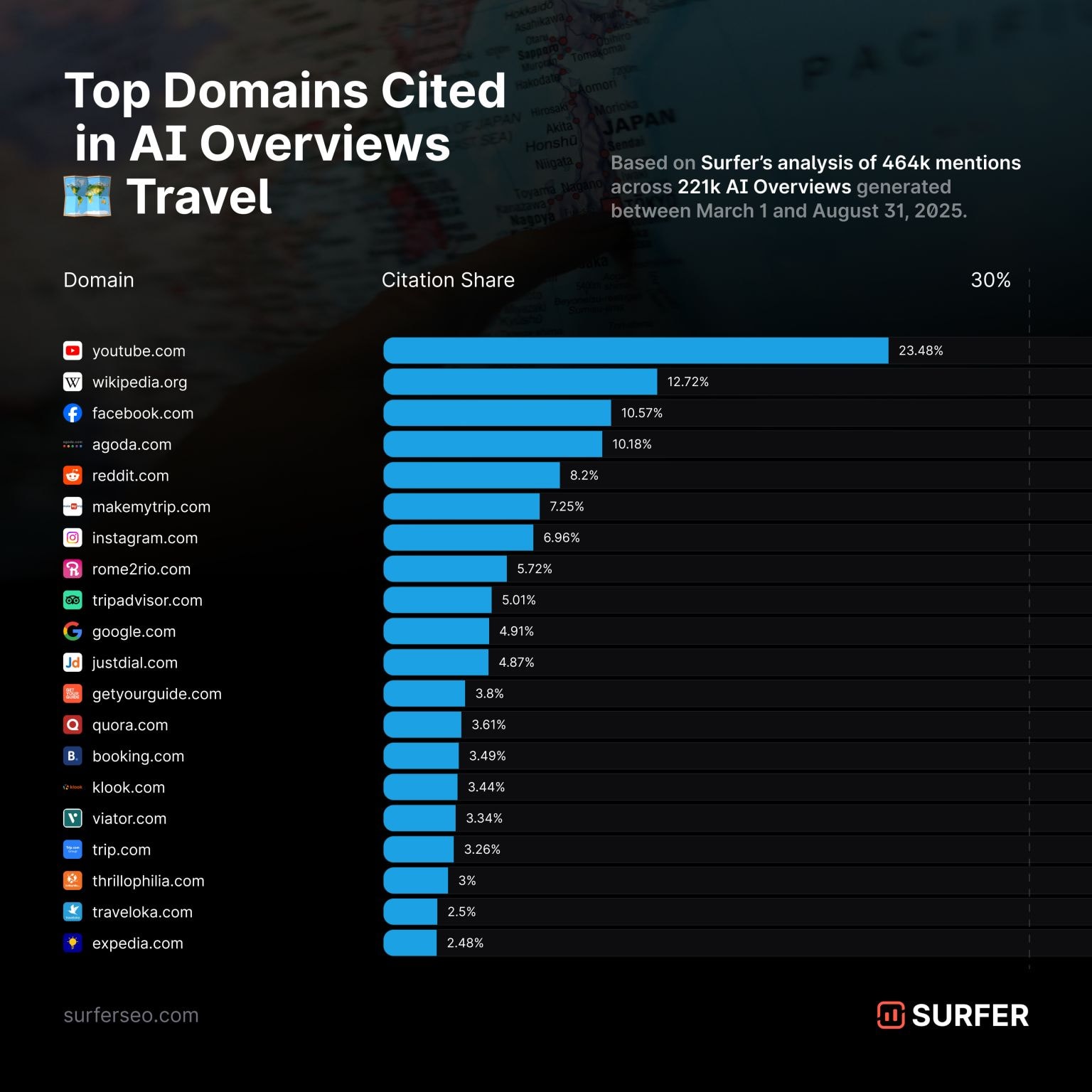
AI Tracker data confirms that travel answers pull from global platforms for scale, local leaders for context, and UGC for candid advice.
AI Overviews are expanding to more regions, making travel information accessible to users worldwide. It mirrors the traveler’s journey from dreaming to booking.
Takeaway: Be the local expert with global visibility: maintain listings, publish destination guides, share inspirational videos, and ensure presence on regional platforms.
How to earn your spot in AI citations
Getting cited by AI isn’t about luck — it’s about alignment. Google’s AI Overviews consistently surface content that’s clear, credible, and context-rich. The data from Surfer’s AI Tracker reveals a repeatable formula that brands can follow to improve their odds of being referenced.
1. Go multi-channel
AI Overviews don’t pull from one type of source. They mix official documentation, video explainers, community insights, and social commentary.
To increase your visibility, publish across multiple platforms — especially YouTube, Reddit, and LinkedIn — where AI already finds authoritative voices.
2. Invest in video
Video is the single most cited content format across every vertical. YouTube alone accounts for nearly a quarter of all citations. Educational, well-structured videos that explain, demonstrate, or summarize complex topics in a human way are highly favored by AI.
AI seems to treat video as both content and context. It doesn’t just extract the transcript, it interprets engagement signals, clarity, and even tone.
3. Build with E-E-A-T
For YMYL topics like health and finance, experience, expertise, authoritativeness, and trust remain the deciding factors.
Verified authorship, citations from credible studies, and visible credentials help AI distinguish trustworthy sources from generic content.
4. Track and adapt
AI citation patterns shift as models evolve. Use Surfer’s AI Tracker to monitor which domains dominate your industry’s citations, then analyze their content structure, tone, and format.
The goal isn’t to copy, it’s to out-serve them with more clarity, relevance, and accessibility.
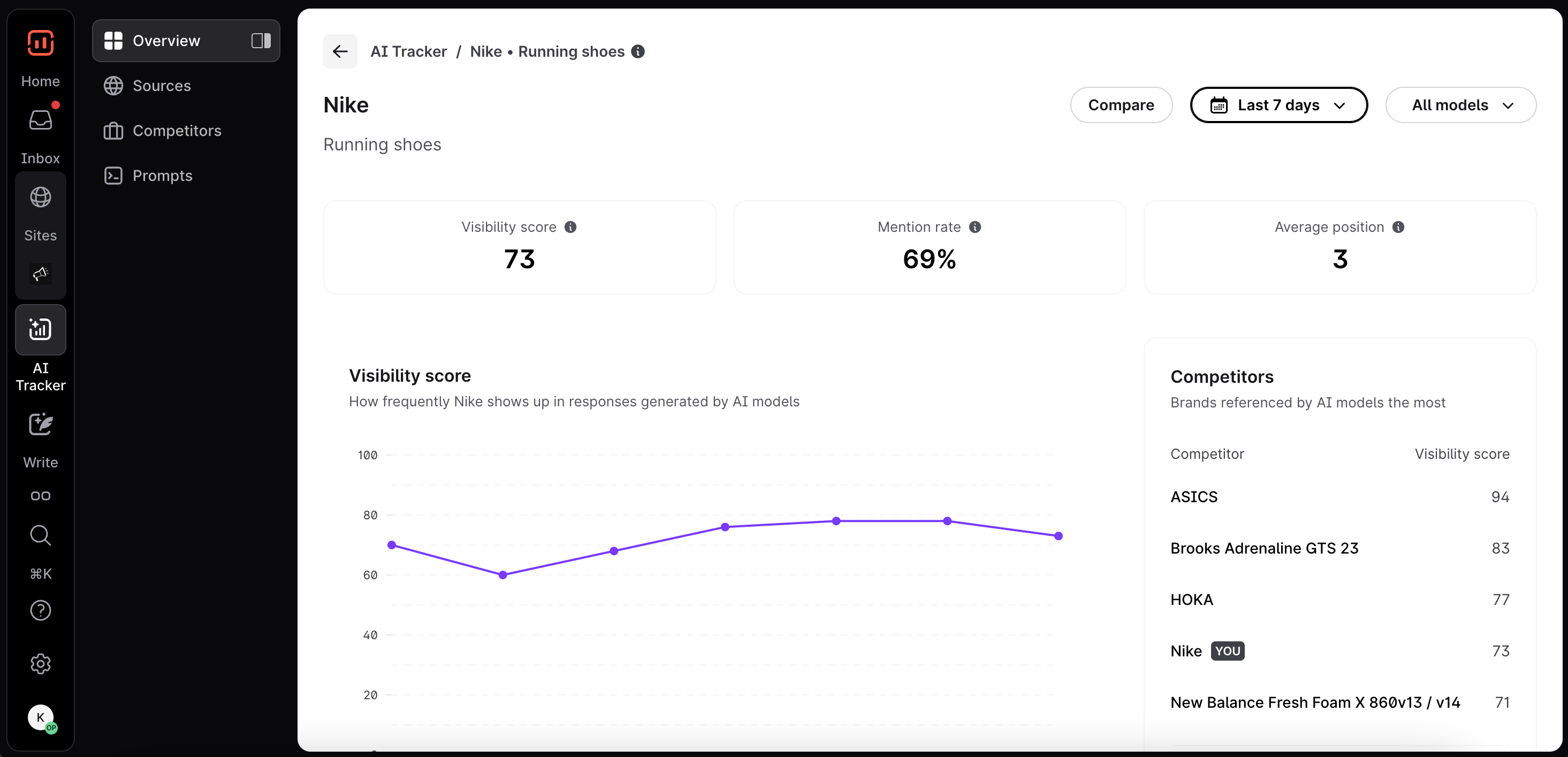
Final thoughts
AI Overviews are changing the rules of visibility. Ranking on page one still matters, but it’s no longer the final destination, it’s just one piece of the discovery puzzle.
The real win is being the source AI trusts enough to cite. That means building content that’s not only optimized for search engines, but also credible, easy to interpret, and genuinely valuable to readers. The domains showing up in millions of AI Overviews have one thing in common: they create content that educates, simplifies, and connects with people, not just algorithms.
The takeaway for marketers?
Be present where AI gathers its knowledge. Combine expert-driven articles with helpful videos, data-backed insights, and community engagement. Structure your content so it’s effortless for both users and AI to extract meaning.
And if you want to see exactly who’s earning those citations — and how you compare — use Surfer’s AI Tracker. It’s your window into the new search landscape, helping you understand what AI trusts today so you can shape what it cites next.



